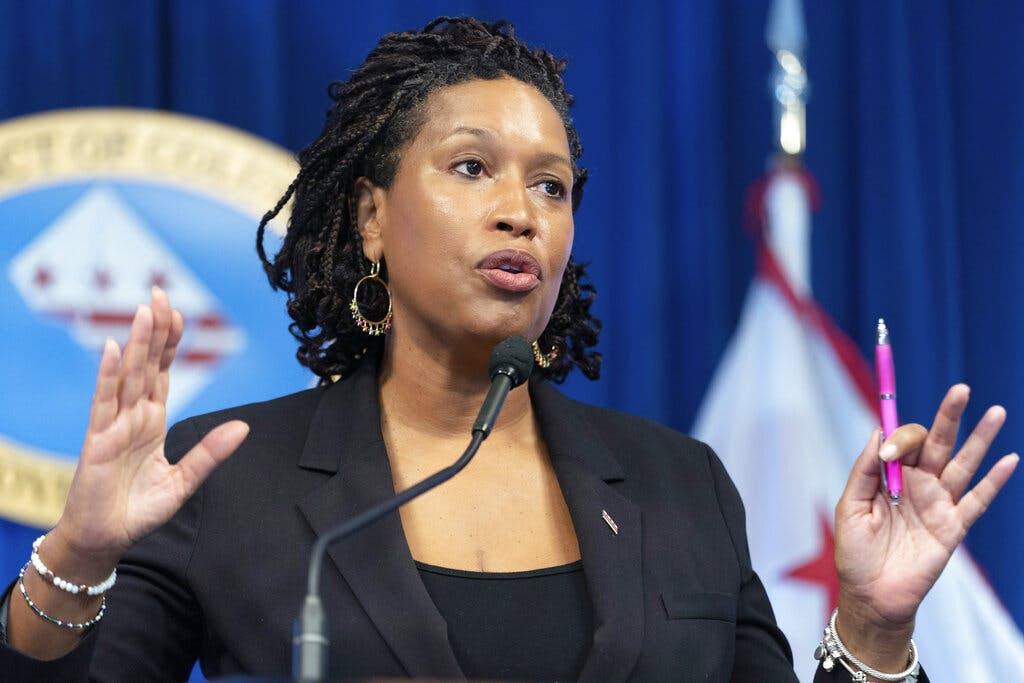House GOP Moves To Block D.C.’s Efforts To Ease Up on Criminals
In the first month of 2023, homicides increased by 40 percent in Washington over the same period last year, motor vehicle theft by 73 percent, and property crime by nearly 40 percent.

Even with crime on the rise across the District of Columbia, the city council wants to make it harder to prosecute violent crimes — over the objections of the city’s mayor, its law enforcement officials, and Republicans in the House.
The proposed overhaul to the Washington, D.C., criminal code was met with pushback by Mayor Bowser, who vetoed the measure and is now offering amendments to the legislation as a compromise position. Republicans in Congress also want to overrule the city council and restore the stricter anti-crime measures.
The House majority leader, Congressman Steve Scalise, highlighted a resolution introduced by the GOP to block the council’s proposed changes Tuesday morning.
“We see carjackings and other violent crime through the roof in D.C.,” Mr. Scalise said. “We’re bringing a resolution to reject that action by the D.C. council. And this is a resolution that has powerful teeth because if it passes the House and passes the Senate, it goes to Joe Biden’s desk … I would be curious to see what the President would do if that bill was on his desk. All we need is two Democratic senators to stand up.”
On Tuesday morning, the House Rules Committee advanced the resolution to the floor, setting up a vote for later this week. A pro-D.C. statehood group, D.C. Vote, lambasted what it called congressional interference in the city’s affairs.
“If this happened in any other jurisdiction in America, there would be outrage,” the group said in a statement. “Congressional interference must end and D.C. statehood is the only logical solution.”
Congressman Andrew Clyde, the lead sponsor of the legislation, called the city’s “radical rewrite of the criminal code” a threat to both “residents and visitors.”
Mr. Clyde has also proposed eliminating the city’s home rule entirely, meaning Congress would become the body that oversees D.C.’s governance. Senator Hagerty plans to introduce a similar bill in the Senate in the coming days, according to Axios.
The changes to the criminal code, which are not set to go into effect until 2025, would reduce the maximum penalties for a number of violent crimes, including armed carjacking, burglary, and robbery. They would also allow more misdemeanor defendants to demand jury trials, and eliminate certain mandatory minimum sentencing guidelines.
In a letter announcing she would veto the original bill last month, Ms. Bowser said the legislation would move too quickly and too drastically. “This bill does not make us safer,” Ms. Bowser wrote. “I believe it is more important to get this opportunity right than to add policies and weaken penalties into what should be a bill that makes D.C. safer.”
The council president, Phil Mendelson, said the mayor is feeding into Republican narratives. “That is irresponsible rhetoric, and it plays into folks like the Freedom Caucus in Congress who are going to use the mayor’s veto and her rhetoric against us when this bill goes up towards Congress,” Mr. Mendelson warned.
Ms. Bowser’s proposed amendments would retain the higher penalties for violent crimes and push the implementation date back to 2027. “People are tired of violence, and right now our focus must be on victims and preventing more people from becoming victims,” Ms. Bowser said in announcing the amendments.
Her concerns seem to have fallen on deaf ears, however, as members of the city council declined to reconsider the provisions. “What we passed was a well-thought-out, deliberate, debated piece of legislation. It doesn’t mean people can’t disagree with it, but simply overturning it leaves us with nothing,” Mr. Mendelson said.
Crime has risen in the city in recent years. In the first month of 2023, homicides increased by 40 percent over the same period last year, motor vehicle theft by 73 percent, and property crime by nearly 40 percent.
Councilman Charles Allen, a strong defender of the criminal reform, claims that the city’s crime statistics should not deter his colleagues from following through with their measure.
“Arizona, Kentucky, Kansas, North Dakota, Ohio, Georgia, and Tennessee have lower maximum penalties for armed carjacking than the D.C. law the GOP members pretend to care about,” Mr. Allen said in a statement.
“Further, Alabama, Texas, Kentucky, Montana, Arkansas, Illinois, Utah, and Virginia have lower mandatory minimums for first-degree murder than D.C.’s duly-approved measure,” he added. “When did Congress tell those state governments they were wrong?”
Washington, D.C. — like many other big cities — is facing the consequences of some criminal justice reforms that were enacted in the name of racial equity after the death of George Floyd.
Chicago’s mayoral election, the first round of which is set to take place this month, has been dominated by the issue of crime. The same crimes that currently plague D.C. — auto theft, burglary, and robbery — have increased dramatically in Chicago in just the last few years.
It is unclear if the Republican measure to overrule the D.C. city council would be ultimately successful. The bill would need to pass the House, the Democratic-controlled Senate, and be signed by President Biden — something no Democrat has yet shown interest in.
In both 2015 and 2017, a Republican-led House passed bills disapproving of certain local laws, but they both died in the Senate.

